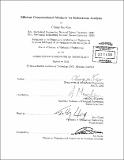Efficient computational methods for robustness analysis
Author(s)
Kao, Chung-Yao, 1972-
DownloadFull printable version (7.454Mb)
Other Contributors
Massachusetts Institute of Technology. Dept. of Mechanical Engineering.
Advisor
Alexandre Megretski.
Terms of use
Metadata
Show full item recordAbstract
Issues of robust stability and performance have dominated the field of systems and control theory because of their practical importance. The recently developed Integral Quadratic Constraint (IQC) based analysis method provides a framework for systematically checking robustness properties of large complex dynamical systems. In IQC analysis, the system to be analyzed is represented as a nominal, Linear Time-Invariant (LTI) subsystem interconnected with a perturbation term. The perturbation is characterized in terms of IQCs. The robustness condition is expressed as a feasibility problem which can be solved using interiorpoint algorithms. Although the systems to be analyzed have nominal LTI subsystems in many applications, this is not always the case. A typical example is the problem of robustness analysis of the oscillatory behavior of nonlinear systems, where the nominal subsystem is generally Linear Periodically Time-Varying (LPTV). The objective of the first part of this thesis is to develop new techniques for robustness analysis of LPTV systems. Two different approaches are proposed. In the first approach, the harmonic terms of the LPTV nominal model are extracted, and the system is transformed into the standard setup for robustness analysis. Robustness analysis is then performed on the transformed system based on the IQC analysis method. In the second approach, we allow the nominal system to remain periodic, and we extend the IQC analysis method to include the case where the nominal system is periodically time-varying. (cont.) The robustness condition of this new approach is posed as semi-infinite convex feasibility problems which requires a new method to solve. A computational algorithm is developed for checking the robustness condition.In the second part of the thesis, we consider the optimization problems arising from IQC analysis. The conventional way of solving these problems is to transform them into semi-definite programs which are then solved using interior-point algorithms. The disadvantage of this approach is that the transformation introduces additional decision variables. In many situations, these auxiliary decision variables become the main computational burden, and the conventional method then becomes very inefficient and time consuming. In the second part of the thesis, a number of specialized algorithms are developed to solve these problems in a more efficient fashion. The crucial advantage in this development is that it avoids the equivalent transformation. The results of numerical experiments confirm that these algorithms can solve a problem arising from IQC analysis much faster than the conventional approach does.
Description
Thesis (Sc. D.)--Massachusetts Institute of Technology, Dept. of Mechanical Engineering, 2002. Includes bibliographical references (p. 209-215).
Date issued
2002Department
Massachusetts Institute of Technology. Department of Mechanical EngineeringPublisher
Massachusetts Institute of Technology
Keywords
Mechanical Engineering.